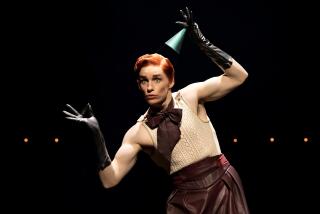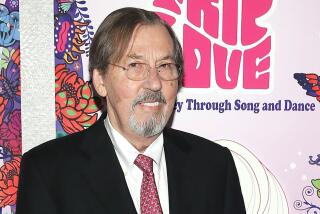PROFILE FRED EBB : ‘Cabaret’ Tales : The lyricist offers behind-the-scenes accounts about the creation of the show and its characters.
A conversation with Fred Ebb, the lyricist of “Cabaret,” gives a theater critic an opportunity to ask the probing questions about the dark themes inherent in the musical, set in Berlin just before and during the rise of Naziism.
But first, I had to ask the question I had been wondering about for years.
Was Liza Minnelli ever considered for the central part of singer Sally Bowles, which was given to Jill Haworth?
After all, Minnelli appeared in the stunning film version of “Cabaret,” so why not the 1967 Broadway original, which was created by many of the same team that had just launched “Flora, the Red Menace,” her first starring vehicle?
“Liza wanted to do it,” Ebb admitted in an interview last week. “She knew of the part and wanted to play it, and even auditioned for it.
“The part was written for an English girl, and Liza auditioned with a Cockney accent. The composer, John Kander, and I wanted her. And our producer, Hal Prince, knew how brilliantly gifted she was. But Hal had a really strong concept of how the show should be done, and insisted that the girl be British and the boy, Clifford Bradshaw, be American. And when you follow Hal, it’s usually not a bad way to go.”
Indeed, Prince’s productions prior to “Cabaret” included “The Pajama Game,” “Damn Yankees,” “West Side Story,” and “A Funny Thing Happened on the Way to the Forum”--not to mention “Flora, the Red Menace.”
“Cabaret,” on the other hand, was Kander and Ebb’s second show, following “Flora,” which was only moderately successful, but won the 18-year-old a Tony award as best actress.
There’s a happy ending, of course-- Minnelli starred in the 1972 film version of “Cabaret,” which had been radically rewritten to accommodate her talents and which won eight Academy Awards, including one for her for best actress.
The show had its genesis, Ebb said, with playwright Joe Masteroff, who had approached producer Prince with the idea of adapting Christopher Isherwood’s “Berlin Stories” as a musical.
“When John and I came in,” Ebb continued, “there was sort of a book (the script) and an outline of how to make it into a musical. We would meet every Sunday and knock it around.
“At one of those meetings, Hal suggested that the opening of the play be a kaleidoscope of life in Berlin, with six or seven brief songs.
“One of those little scenes was set in a nightclub, with a little master of ceremonies who sang ‘Willkommen.’ Hal seized on the character and suggested Joel Gray. Then Johnny and I started conceiving the part with what we knew to be Joel’s vocal range and his dramatic strengths.”
Creating the character of American novelist Clifford Bradshaw was singer-actor Bert Convy, who died last month.
“Bert just came to a general audition that we had,” Ebb recalled, “and was terrific. Hal had used him in ‘Fiddler’ and I’d known him from an off-Broadway play. He was handsome, sturdy . . . and it was very important that he be very square in that part, to play off of Sally’s giddiness.”
Ebb, now 56, and Kander have had a nearly 30-year collaborative career that debuted with the 1963 hit song “My Coloring Book” and includes the scores to Broadway musicals including “The Happy Time,” “Zorba,” and “Woman of the Year.”
Both have worked extensively with Minnelli.
Ironically and coincidentally the first recording of a Fred Ebb lyric was when Minnelli’s mother, Judy Garland, cut his and Philip Springer’s “Heartbroken” in 1953.
Kander and Ebb supplied Minnelli with special material for nightclub acts, the television special “Liza with a Z,’ and the Broadway show “The Rink.”
Looking back, Ebb offered some advice to those who reach great success.
“John and I did a show a year for five years, and none of them matched the triumph of the first one. I’m now prepared to counsel all young writers that I’m not sure that I took enough time to enjoy the aftermath of ‘Cabaret.’ ”
More to Read
The biggest entertainment stories
Get our big stories about Hollywood, film, television, music, arts, culture and more right in your inbox as soon as they publish.
You may occasionally receive promotional content from the Los Angeles Times.










